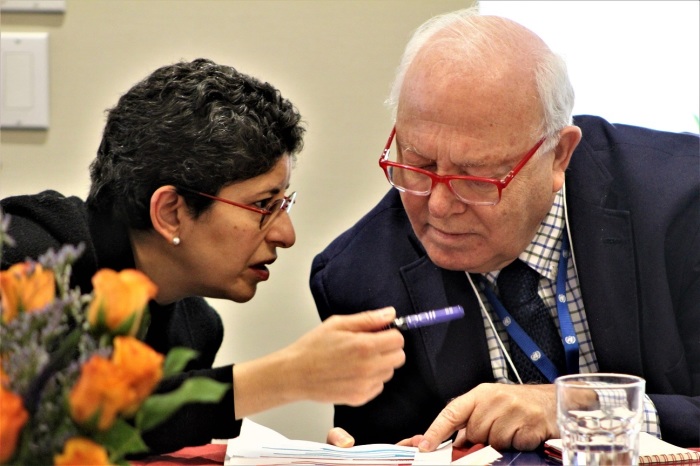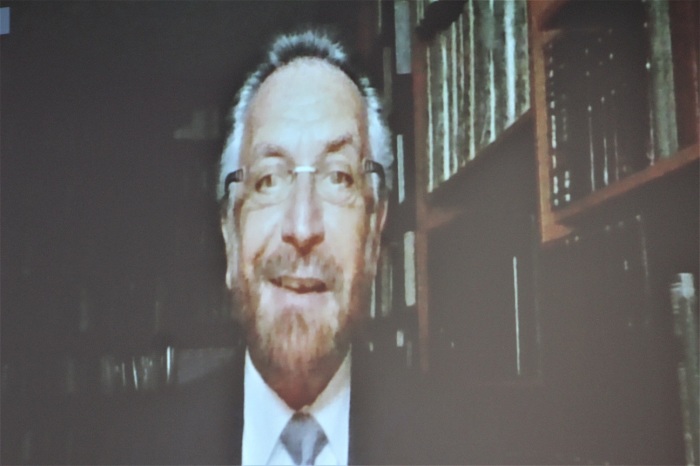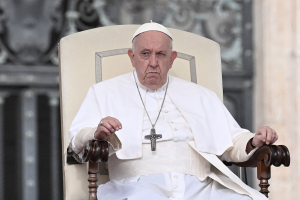UN urged to promote religious engagement and literacy, especially in the West

NEW YORK — The United Nations was urged to use its status as the seat of global politics to promote the “importance of religious engagement and literacy” to advance development and diplomacy at a worldwide gathering of diplomats and representatives of various religious institutions Friday.
The meeting held at the U.N. Church Center in midtown Manhattan was organized by Religions for Peace and the U.N. Alliance of Civilizations under the theme, “Faith and Diplomacy: Strategic reflections on religiously inspired efforts towards building peaceful, just and inclusive societies.”
Religions for Peace, led by Prof. Azza Karam, is the world’s largest and most representative multi-religious coalition advancing common action among religious communities for peace. The organization works to transform violent conflict, advance human development, promote just and harmonious societies and protect the Earth.
“Religions for Peace is the United Nations of religious institutions. … There is not a single faith community that is unrepresented on the Council of Religions for Peace,” Karam said in welcoming the audience on Friday. “As such, we are deeply honored and constantly humbled when we listen to our faith leaders speak.”
Several members of the diplomatic and religious communities shared various recommendations on the nexus between faith and diplomacy.
But it was Chief Rabbi David Rosen, the international director of the Department of Interreligious Affairs at the American Jewish Committee, who argued that a lack of “religious sensibility” and “religious literacy” among diplomats in the West is causing them to miss out on the “critical value of engagement with religions.”

“We know from the famous Pew study that some 84% of our world considers religion to play an important part in their lives. And that to ignore the influence, power and capacities of religions is foolhardy, counterproductive. It is akrasia,” Rosen said.
“It would, therefore, be funny if it were not so sad to see how so many Western countries in particular disregard the critical value of engagement with religions. More often than not, it is because the people engaged with diplomacy themselves are lacking in religious sensibility, let alone religious literacy,” he continued. “The situation is often even worse in the field of development where it is not unusual to find an ignorance of religious realities and even hostility towards religion — which is sometimes considered the enemy, an attitude which, again, is totally self-defeating.”
Miguel Angel Moratinos, the high representative of the U.N. Alliance of Civilizations, highlighted that while the world has become increasingly complex, religious and cultural issues remained at the heart of much of the conflict around the world today.
“If you go to most of the diplomats and member states here taking part in the normal life of the U.N. system, they will be in absolute agreement with me that if you go to the agenda of the Security Council today, you will have practically 90% or 95% of the crisis, conflict have a cultural or religious dimension,” he said. “So that means that you cannot ignore the religious and cultural dimension of any crisis or problem that affect the peace and security in the world.”
Rosen explained that globally, faith and religions are manifested differently, making it impossible to discuss faith generically.
“Not all religions are about faith. Faith is a varying element in religions and sometimes even quite marginal. This makes the widespread use of the word in the West problematic to begin with. But even if we refer to religion, a more encompassing term than faith, it also cannot be generalized about,” he said.
“Religions vary from one context to another. Indeed the same religion may have a very different character at one time or place from the same religion in other times or places. Even more to the subject of our consultation, the relationship between a religion and the political authority or civil society varies enormously from one context to another.
“Variety extends from places in our world where religion is the foundational fabric of society and where religious leaders exercise overwhelming influence to places where religious institutions have lost virtually all temporal power but where many people expect it to offer some kind of moral guidance,” he added. “We need to talk about religions in the plural and to understand that each context has to be addressed with its own particularity.”
Rosen also said that while there are good arguments that can be made for the alienation of religion in some contexts, “the perversion or prostitution of something is no proof of its inherent value or lack thereof.”
“There are, of course, some good reasons for alienation from religions where one sees the terrible things that have been done and often are still done in their names. … The role that religions have to play, both in development and diplomacy, is so great that to ignore it is to undermine one’s own interest,” the rabbi said.
“What should be clear … is the importance of bringing the worlds of diplomacy and religions to learn about one another and to support one another in the pursuit of peace and reconciliation and the promotion of the common good,” he argued before noting that Religions for Peace and the UNAOC should be used in the U.N. system to “highlight the importance of religious engagement and literacy.”
Rosen added that the U.N. should be a structure highlighting “the importance of religious engagement and literacy.”
“And a fact that it established the Alliance of Civilizations and has collaborated in the past closely with Religions for Peace should make them the natural agencies to entrust this crucial task,” he said. “However, first and foremost, it requires that the leadership of the U.N. itself charges its member states to engage with these bodies developing the key capacities for those working on international issues, strategizing together in relation to each and any given context precisely to assess the role that each can play and the potential of their mutual collaboration.”




























